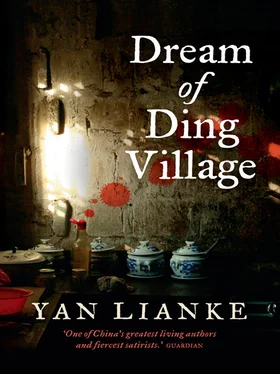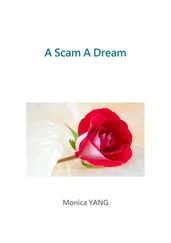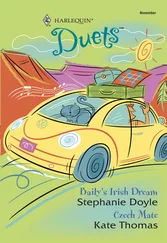There was nothing to think about, nothing to worry about. You could take long walks in the courtyard or stay in bed all day if you liked. No one would bother you or boss you around. You were as free as a dandelion in a field.
If you got homesick, you could visit your family in the village. If you missed your crops, you could go and check on your fields. If there was something you needed, you could send a message to your family and they would bring it to the school.
For a few weeks, life in the school seemed a paradise beyond compare. But this paradise didn’t last for long.
There was a thief in the school. Like a rat, the thief seemed to be able to get into every nook and cranny. It started when half a sack of rice went missing from the kitchen. Then a whole bag of soybeans disappeared from a corner by the stove. Not long after that, Li Sanren complained that the forty yuan he had stashed under his pillow was gone. The next victim was Ding Xiaoming’s young wife, Yang Lingling. Ding Xiaoming was a cousin of ours on our father’s side. His grandpa and my grandpa were brothers, which made him a first cousin to my father and my uncle. Lingling, who was still in her early twenties, had found out that she had the fever soon after marrying into our village. It turns out that a few years earlier, while living with her parents in her hometown, she had sold her blood. Although she never blamed anyone for giving her the disease, she spent every day silent and worried. She never smiled. The day her husband learned she had the fever, he smacked her hard across the face and shouted: ‘The first time we met, I asked if you’d ever sold blood and you swore up and down that you hadn’t! What do you have to say for yourself now?’
The beating left Lingling’s face swollen, and her spirit bruised. It made her never want to smile again. It made her not want to go on living. Especially after her husband dropped her off at the school to live with the other sick people.
A week after she arrived at the school, Lingling discovered that the brand new, red silk padded jacket she’d hung from her bedpost had disappeared. One evening, when she went to put it on, it just wasn’t there.
The thefts in the school were escalating like an infestation of rats. Something had to be done. Grandpa called everyone to another meeting in the large classroom.
‘At this point,’ Grandpa began in a loud voice, ‘most of you are nearing the end of your lives. Why on earth would you steal money or grain or a brand-new silk jacket? What good is money if you’re not alive to spend it? What good is grain once you’re in your grave? You’ve got stoves and plenty of firewood to keep you warm. . why would any of you need to steal someone else’s things?
‘Starting today,’ Grandpa continued, ‘no one leaves this school to go back home. I want to make sure that the things that were stolen stay right here. That’s number one. Number two: I’m not going to conduct an investigation into who was responsible, but I expect the thief to return the stolen goods. You can wait until tonight and put them back when it’s dark. I want the grain returned to the kitchen, the money given back to its rightful owner and the jacket hanging on the bedpost where you found it.’
The setting sun inched across the courtyard, filling the classroom with its crimson rays. The winter wind began to howl; a sudden gust sent ash from the classroom stove scattering in all directions. While Grandpa was speaking, the villagers gazed suspiciously at one another, searching each face — some clearly sick, some healthier — for signs of larceny. But stare as they might, it was impossible to tell who was the thief among them.
From the middle of the crowd, my uncle shouted: ‘Search! Search!’ Several of the younger men took up his cry: ‘Search! Search the rooms!’
Grandpa tried to restore calm. ‘There’s no need to search,’ he said from the podium. ‘All I ask is that the things be returned tonight. If you’re too embarrassed to face the owners, you can just leave the items in the courtyard after everyone’s gone to bed.’
With that, Grandpa ended the meeting and dismissed the villagers. There was much grumbling as they left the classroom, mostly from the men, who wondered what sort of greedy bastard would steal half a bag of grain when he was on the verge of dying anyway.
On the way out, Uncle caught up with his cousin’s wife.
‘Lingling,’ he told her, ‘you really should have put your clothes in a safer place.’
‘It was just a jacket. Where else was I supposed to hang it?’
‘I’ve got an extra sweater you can borrow, if you like.’
‘No, thanks. I’m okay. I’m wearing two sweaters already.’
That night, some of the residents were chatting or watching television as usual. Others were in the kitchens and classrooms boiling their own concoctions of herbal remedies. In every classroom, storage room, corridor and stairwell, there were small makeshift stoves and clay pots bubbling with medicinal herbs, the dregs of which the villagers drank as a cure for the fever. Day and night, the pungent, bitter smell filled the school, drifting out of the yard and across the plain. It was as though the little school was a pharmaceutical factory manufacturing herbal remedies.
Once everyone had taken his or her medicine, it was time for bed. One by one, the residents fell asleep. The schoolyard was as silent as the plain, the plain as silent as a desert. All that could be heard was the whistle of the winter wind outside.
In Grandpa’s rooms, Uncle was lying in his bed beneath the window. When he had first moved in, he’d had to clear away piles of old homework notebooks just to make room for his bed. Now that his wife Tingting had left the village and moved back in with her mother, Uncle was worried.
‘Hey, Dad,’ he said, ‘did you ever talk to Tingting about that thing I asked?’
‘What thing?’
‘About not letting her get remarried after I die.’
‘Go to sleep, son.’
There was no more conversation after that. The gloomy winter night made the darkness inside the little room seem thick and oppressive, the air sticky like glue. The hour was late, the night as deep and dark as a well. In the eerie silence, Uncle heard what sounded like footsteps outside. He waited for a moment, listening carefully, then rolled over in his bed and asked, ‘Dad, which one of the villagers is the thief, do you suppose?’
In the silence while he waited for Grandpa to answer, Uncle thought he heard footsteps again. Someone was out there, he was sure of it.
‘Dad!’ he hissed. ‘Are you awake?’
Still no answer.
As there was no sound from Grandpa, Uncle slowly sat up. He thought he might as well go out into the courtyard and try to get a look at the thief. Silently, he crept out of bed and draped his coat over his shoulders. He was nearly out of the door when Grandpa rolled over in his bed.
‘Where are you going?’
‘Oh, I thought you were asleep.’
‘I asked where you were going.’
‘Tingting went back to her mother today, so I’m in no mood to sleep.’
With an effort, Grandpa sat up in his bed. ‘Honestly, boy, I don’t know what’s the matter with you.’
‘Dad, there’s something you don’t know. The truth is, Tingting was engaged to someone else before she married me. His family lives in the same village as her mother. That’s the reason why I’m so worried.’
Grandpa peered up at his son but said nothing. In the darkness, he couldn’t see Uncle’s face, just a shadowy figure looming close to the door. He might just as well be looking at a charred pillar of wood.
After a while, Grandpa asked, ‘Did you take your medicine today?’
‘Don’t bother, Dad. I know there’s no cure for what I’ve got.’
Читать дальше












